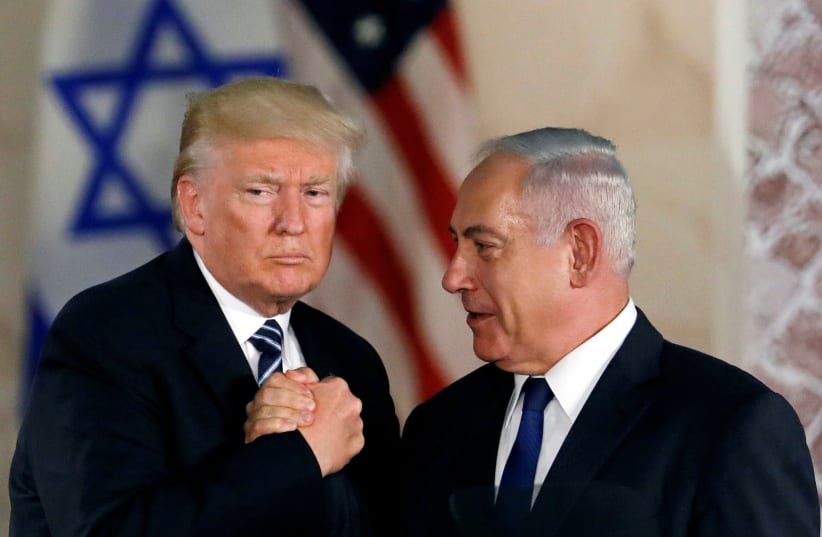It’s difficult to keep track of time these days, but it has been more than three weeks since the Iranian ballistic missile attack. The barrage included over 180 ballistic missiles, which substantially damaged two air force bases and also caused significant damage to up to a thousand homes in Hod Hasharon.
Although initially, every Israeli political and defense official made loud predictions of bringing down fire and brimstone on Tehran “soon” in response, three weeks have passed – two-and-a-half weeks longer than it took Israel to respond to Iran’s ballistic missile attack in April.
The question now is: will the counterattack still happen, and if it does, will it still be before the November 5 US presidential election?
Sources had previously said that it is crucial to act before the election so as not to provoke the new president-elect after the contest is decided.
Another way of viewing the timing is that it will happen at a time that impacts the election.
Despite heightened talk of a ceasefire following Sinwar’s death on October 16, sources told The Jerusalem Post that there will be no ceasefire until after Israel attacks the Islamic Republic – and that the attack will happen before November 5.
Conspiracy theorists will say that Prime Minister Benjamin Netanyahu is holding off on attacking Iran until as close to election day as possible to try to help his preferred US presidential candidate, former president Donald Trump.
US elections at stake
It is true that if Israel attacks Iran in the next 13 days, it would almost certainly impact the US election, especially given how close it is. It is also true that Netanyahu would prefer Trump defeat US presidential candidate and Vice President Kamala Harris.
However, connecting those two factors does not prove causality or a conspiracy, and Iran’s decision to attack Israel on October 1 was entirely its own, not Netanyahu’s. Instead, Netanyahu may be hoping that if he hits Iran close to November 5, election day will pass before Tehran can hit back, which will deter Tehran from exacting revenge.
However, there is another area that is virtually entirely under Netanyahu’s control, where there is stronger evidence of timing being used, at least partially, to influence the US election - his decision on when to invade Lebanon and when to end that invasion.
On October 11, 2023, Defense Minister Yoav Gallant and the majority of the defense establishment wanted to strike Hezbollah even harder than Israel ended up doing over the last month. From June, then-war cabinet member Benny Gantz campaigned publicly for Netanyahu to strike Hezbollah. So, why did Netanyahu delay that attack until mid-September?
For this, there are certainly reasons to explain the timing other than impacting the US presidential election.
Earlier in the year, negotiations were still serious about reaching a ceasefire with Hamas, which could have also included a ceasefire with Hezbollah – something the US had consistently pressed for. Plus, the IDF had not yet fully rooted out Hamas’s battalions in Rafah.
But Netanyahu has been partially responsible for hostage negotiations failing when he rejected Gallant and the IDF’s push to cut a deal in return for withdrawing from Gaza temporarily for around 40 days. Also, while Gallant only announced the defeat of Hamas’s Rafah battalion on August 21, top military sources told the Post that almost all of Hamas in Rafah was already beaten by mid-June.
All of this reinforces the idea that Netanyahu struck Hezbollah to delay hostage negotiations and potentially influence the election.
So, what explains the timing?
Within 24 hours of the invasion of Lebanon, some senior military officials informed the media that the war would conclude between October 14 and 21, reinforcing this estimate even a week into the conflict.
On Monday, sources said the war should be wrapped up in the next week or so.
This means that from a professional military perspective, the invasion should end before election day.
Yet, defense sources have implied that Netanyahu is pushing off any negotiations over a new security situation with Hezbollah, which would also end the invasion.
Again, he might be doing this to tear down Hezbollah’s capabilities – something that Israel might not get to do again with this intensity for a long time.
But, upon further examination, Israel’s targets in Lebanon in recent days are all important but far from game changers: Hezbollah’s money, its navy, mid-level commanders, and more of the same weapons in southern Lebanese villages that it has been capturing or destroying for three weeks.
From the point of view of defense sources, there is no strong enough military reason to continue the invasion, as it is currently limited beyond the next week or so.
Will Netanyahu draw out the invasion past election day on grounds that are more political than military? And could this connect back to the timing of attacking Iran, even if Netanyahu did not actively set up the current face-off with the ayatollahs?
These are complex questions, and in answering them, it is also important to see exactly how the Iran and Hezbollah conflicts play out between now and November 5.

